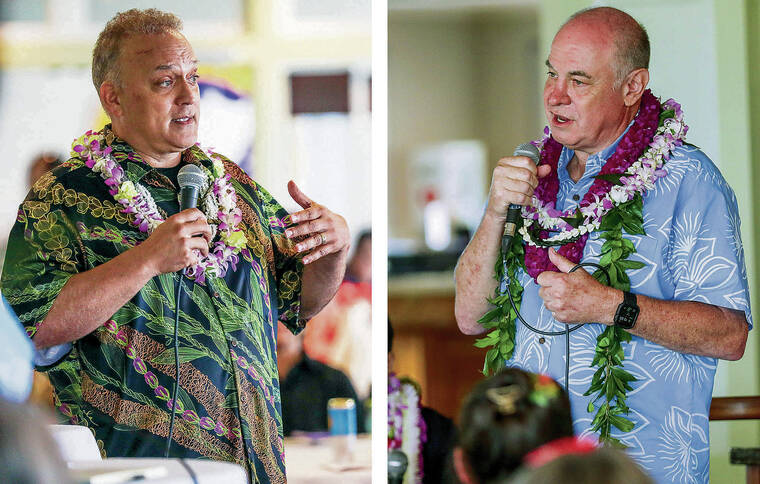Neighbor island voters have more decisions to make in the Nov. 5 general election for county government leadership than on Oahu, including county council representatives and the marquee contest in the state.
The headliner bout, for Hawaii island mayor, is between incumbent Mitch Roth and challenger Kimo Alameda.
“It’s definitely the marquee race headed into the general election,” said Colin Moore, a political scientist at the University of Hawaii at Manoa. “I think it could go either way.”
Roth is a former Hawaii County prosecutor who moved to the state more than 40 years ago and is a University of Hawaii graduate. He also has been a deputy prosecutor on Oahu, and is seeking a second mayoral term after defeating prior incumbent and three-term Mayor Harry Kim.
Alameda is a psychologist who was most recently vice president of business development for the Hawai‘i Island Community Health Center and once led Hawaii County’s Office of Aging. He was born and raised on Hawaii island and has charisma some compare to the late former Hawaii island Mayor Billy Kenoi.
In the Aug. 10 primary election, Roth received 38% of the votes compared with 28% for Alameda. But four other challengers attracted the balance, representing about 17,000 votes, or roughly 34%, cast by voters who could swing the outcome of who becomes the next chief executive for Hawaii County.
Since the primary election, Roth and Alameda have participated in several head-to-head debates or forums, including events held by the Council for Native Hawaiian Advancement, Big Island Press Club and “Insights” television show on PBS Hawaii.
The two candidates have sparred over issues including affordable housing, building permit processing times, homelessness, sewage treatment plant infrastructure, the county budget and other things.
Moore said Roth, who has an advantage as the incumbent and recently had a bigger campaign spending war chest, is only a slight favorite.
Roth had more money to spend than Alameda leading up to the general election, according to state Campaign Spending Commission disclosure reports filed Oct. 1.
From Aug. 11 to Sept. 26, Roth added $26,470 in campaign contributions to $112,358 he had on hand after the primary election. In the same period, Roth spent $22,054 of the $138,828 total, leaving $116,774 at his disposal.
By comparison, Alameda raised $98,916 from Aug. 11 to Sept. 26 on top of $1,738 previously on hand, and spent $43,035 during this period, leaving $57,619 available.
Labor unions, which can provide helpful endorsements, are split between the two candidates.
Leadership of the Hawaii Government Employees Association and United Public Workers, the two biggest public worker unions in the state, have endorsed Alameda. The challenger also has received endorsements from the State of Hawaii Organization of Police Officers and the Hawaii Ironworkers Union.
Moore said those endorsements stemmed at least in part from Roth’s opposition to COVID-19 hazard pay for county workers.
Roth has been endorsed by private-sector unions, including the International Longshore and Warehouse Union, the Laborers’ International Union, the United Brotherhood of Carpenters &Joiners of America, the International Union of Operating Engineers and the union representing plumbers and pipefitters.
Roth also has been endorsed by the Hawaii Lodging &Tourism Association, the General Contractors Association of Hawaii and the Japanese Chamber of Commerce &Industry of Hawaii.
In addition to the race for Hawaii County mayor, neighbor island voters have several competitive choices for county council representatives.
The tightest expected match-up in these races is for a Maui County Council seat between incumbent Tom Cook and former Council member Kelly King.
In the primary election, Cook received 11,763 votes, or 144 more than the 11,619 received by King. A third-place finisher received 1,601 votes and did not advance to the general election for the Council seat representing South Maui.
One other Maui County Council seat contest is on the general election ballot. This one features incumbent Yuki Lei Sugimura, who got more than three times as many votes in the primary election as second-place finisher Jocelyn Cruz for the Upcountry seat.
For the Hawaii County Council, two incumbents are defending their seats in the general election.
One of these incumbents, Cindy Evans, received 38% of the vote in the primary election to lag challenger James Hustace, who received 44% of the votes for the District 9 seat.
The other Hawaii County Council incumbent, Matt Kaneali‘i-Kleinfelder, garnered 45% of the votes in the primary ahead of Ikaika Rodenhurst, who received 26% of the votes to represent District 5.
For the seven-member Kauai County Council, there are no geographical districts, so all voters on the island get to select seven representatives from 14 candidates after narrowing the field from 17 in the primary.
In the primary, six of seven Kauai County Council incumbents were the top vote-getters.
The six, in ranked order from the top, were Bernard Carvalho Jr., Mel Rapozo, Ross Kagawa, KipuKai Kualii, Felicia Cowden and Addison Bulosan.
Arryl Kaneshiro was the outsider, and received the third-most votes among the top seven.
In eighth place was incumbent Billy DeCosta. A close ninth place was held by Fern Holland.
Other candidates, who received less than half as many votes as Holland in the primary and made it to the general election contest, are Abe Apilado Jr., Sherri Cummings, W. Butch Keahiolalo, Jacquelyn Nelson and Bart Thomas.


 Stay updated on Hawaii and national elections coverage
Stay updated on Hawaii and national elections coverage